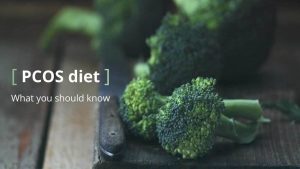Polycystic Ovary Syndrome (PCOS) and Diet
What is PCOS?
Polycystic Ovary Syndrome (PCOS) is a common hormonal condition which globally affects 10% of women at a child bearing age, and is the leading cause of female infertility. The disorder is characterised by many cysts which form on the ovaries, irregular periods, and an excess of the male hormone androgen. The “cysts” that form on the ovaries are actually follicles or eggs, that due to the abnormal levels of hormones that control ovulation, the follicles have matured but have not been released. The causes of PCOS are still uncertain, but the disorder is thought to be strongly associated with insulin resistance, inflammation, obesity, and heredity.
Normal menstrual cycle:
First, to understand the physiology of PCOS it helps to understand what a normal menstrual period is. In a regular menstrual cycle the Luteinizing hormone (LH) and Follicle Stimulating hormone (FSH) control the development and release of the follicle, which matures in the ovaries, and is released as an egg at the beginning of ovulation.
PCOS menstrual cycle:
Although, women who have PCOS still have the LH and FSH present, the hormone levels are not at the required balance to promote the normal ovulation sequence. A consequence of the imbalance is that the egg ready for ovulation does not leave the ovary. If the eggs are not released, as seen in PCOS, the ovaries form multiple follicles that are surrounded by fluid-filled sacks, giving the appearance of cysts.
What are the signs and symptoms of PCOS?
- Weight gain, central obesity
- Excessive growth of facial or/and body hair due to elevated androgen levels (male hormone)
- Hair loss
- Irregular periods which are longer than normal, or lack of periods
- Severe acne
- Mood changes and low self-esteem
- Infertility
- Sleep apnoea
How to detect PCOS?
Blood tests will almost always show higher levels of androgens (male hormones) and insulin resistance, often these results go hand in hand perpetuating the condition. Insulin is a hormone made by the pancreas that enables glucose to enter into cells where it can then be used for energy. However when the body is insulin resistant, higher levels of insulin are required to maintain normal blood sugar levels in the blood, putting increased pressure on the pancreas (and increased risk of developing diabetes type 2). Unfortunately for women suffering with PCOS, these elevated levels of insulin in the blood causes the body to store fat and the ovaries to produce more male hormones, worsening the unpleasant symptoms of PCOS.
How to manage PCOS:
Weight management: Studies have proven that the most beneficial diet/eating plan for women with PCOS is one that promotes weight loss and reduces insulin levels. By following a low-carb diet you can lower your insulin levels which in turn can balance the hormonal system.
Mental health: The potential hair growth, weight gain, and infertility can have a negative effect on a person’s self-esteem causing anxiety and depression. It is vitally important to seek help if you are feeling this way.
Exercise: It is proven that moderate exercise can improve PCOS symptoms and is also beneficial for fertility.
Can PCOS be managed by changing the way you eat?

Yes! It absolutely can be and here is what you need to know! Studies have proven that the most beneficial diet/eating plan for women with PCOS is one that promotes weight loss and reduces insulin levels.
An LCHF diet is an increasingly popular way to manage PCOS symptoms. It limits refined carbohydrates, sugars and processed oils and in doing so reduced the bodies need for insulin, improves insulin sensitivity and increases fat loss with the ability to control or reverse metabolic issues without medication. With decreased levels of insulin within the blood, less androgens (male hormones) are produced and many of the symptoms of PCOS can be reduced and some may even disappear.
Improved Fertility
By following a low-carb diet you can lower your insulin levels which in turn can balance the hormonal system, enabling a normal menstrual cycle and ovulation. Many women have been able to manage or reverse their PCOS symptoms through an LCHF diet to lose weight and fall pregnant.
Summary
Our free e-books available HERE may be able to give you some direction to start with.
If this blog has raised any concerns for you and you wish to speak with one of our team members for further advice on how you can optimise your nutrition, then please refer to our contact page HERE.
Information Sources
Consensus on women’s health aspects of polycystic ovary syndrome (PCOS)
The effects of a low-carbohydrate, ketogenic diet on the polycystic ovary syndrome: a pilot study.
Thank you for sharing!






